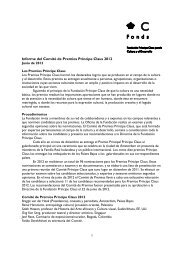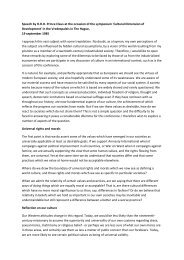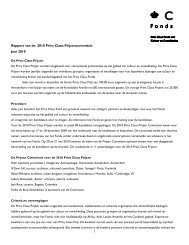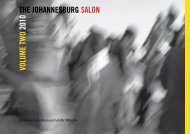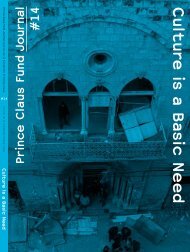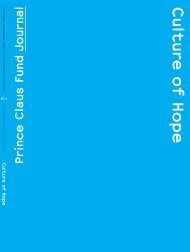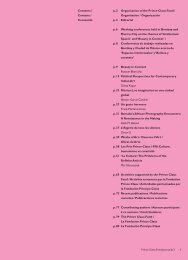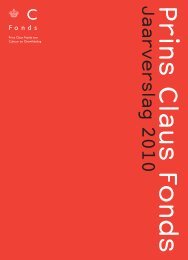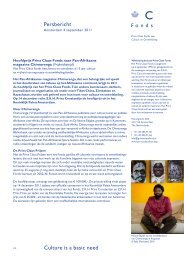3 summer 2011 - Prince Claus Fund
3 summer 2011 - Prince Claus Fund
3 summer 2011 - Prince Claus Fund
- No tags were found...
Create successful ePaper yourself
Turn your PDF publications into a flip-book with our unique Google optimized e-Paper software.
The lessons of creativity and humanism handed down by the Greek tragedians, byShakespeare and Cervantes, were not heeded by the optimism of the Enlightenmentand the modern world. Since the 18th Century, we have been assured that progressis inevitable and happiness our destiny. Our blindness to the possibilities offailure made sure that if happiness and progress failed, we would not have theintellectual and emotional safeguards with which to renew ourselves, our lives,our politics. We would be caught unawares. But the Devil, wrote André Gide,adores those who do not believe in him; he is just waiting to pounce on people’sunawareness of evil.The 20th century - the short 20th century - was born in a blaze of optimism anddied in a long night of pessimism. Unawareness of the demonic forces of humanityled to Auschwitz and the Gulag, the holocaust and the concentration camp, thediabolical figures of Adolf Hitler and Joseph Stalin. Again: Never before has thegap between extraordinary scientific and technological development and moraland political lag, been greater.Certainly, creative humanism has borne witness and offered imagination to theplight of the 20th century. Not in vain the indispensable 20th century writer,Franz Kafka, derided by political commissars of Left and Right as an irresponsiblefantasist, is the only realist writer, in a profound sense, of the nightmare ofpersonal violence, loss of identity and inevitable pain that has forever tarnishedour century and our lives.The first hero of the modern novel, Don Quixote, thinks he is a gallant knight ofchivalry. The last hero, Kafka’s Gregor Samsa in ‘The Metamorphosis’, wakes upone morning and discovers that he has become a bug. In that misty awakening inPrague, Kafka restores tragedy and offers us the most terrible promise ofhappiness: ‘there shall be much hope, but not for us’. Indeed, the supposedlysurreal, fantastical Kafka turned out to be the most realistic, almost clinicalwriter of our time. His despair leads directly to Samuel Beckett’s shivering graveof humanism: ‘I do not exist. The fact is self evident’, writes the author of‘Waiting for Godot’. The creative imagination thus announces that in our time,the bearer of humanism, the human being, is also dead.Should we surrender to this despair? Should we give in to this nihilism? The lasthero has no face or, at the most, he has the head of an insect. Should we cut offhis horrible head? Or should we rather seek out our - his-her - new human features?Should we surrender to the delightful tickles of a world of technology as pureentertainment - or as pure, manipulative speculation? Has not the end of theCold War given a face to the multiple cultures of humankind, long hidden byideological masks?Another great writer, William Faulkner, gives us a clue in this direction. Faulknerwrites within the most optimistic and future-oriented of all societies, that ofthe United States of America, a culture where nothing succeeds like success.This makes the US an eccentric country, since most nations have a direct andoverwhelming experience of failure. Faulkner dissented from the foundingoptimism of the American Dream and said: We, too, can fail. We, too, can bear thecross of tragedy. It: is called racism. The North did not defeat the South. TheSouth had already defeated itself by enslaving, humiliating, persecuting otherhuman beings because they were different. Yet the pain of tragedy can redeemus, if within it we can recognise the humanity that we share with others. Faulkneroffers the clearest guide to a new humanism defined as the recognition of theother, the capacity to live with he or she who are not like you or me; totranscend differences and weave a common tapestry.Today, now that the Cold War is over, the discarding of the shirt that we worefor fifty years tears away, like the garment of the mythological Nessus, our veryskin. This means that our skin must change, so that it can touch, come into<strong>Prince</strong> <strong>Claus</strong> <strong>Fund</strong> Reader #1 · Summer <strong>2011</strong> · 90




